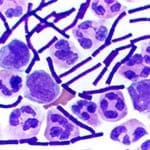 Researchers at Acharya Nagarjuna University in India have carried out a search of the Bacillus anthracis bacterial genome, revealing a clutch of targets for new drugs to combat an epidemic of anthrax or a biological weapons attack.
Researchers at Acharya Nagarjuna University in India have carried out a search of the Bacillus anthracis bacterial genome, revealing a clutch of targets for new drugs to combat an epidemic of anthrax or a biological weapons attack.
The study, conducted in collaboration with the Osmanaia University College for Women, identified 270 non-redundant, non-human homologous genes and 103 essential genes of the bacteria as possible drug targets. Each are proteins that are found in the bacteria but not in humans and are involved in diverse bacterial processes such as metabolism, cell wall synthesis and bacterial persistence.
The researchers identified sixteen membrane-bound proteins, seven proteases and three adhesion molecules that are all novel. The discovery of a range of targets might bode well for creating a drug cocktail that could preclude the emergence of drug resistance.
Early diagnosis and treatment with potent antibiotics is essential in any of the three clinical forms of anthrax: cutaneous, gastrointestinal and pulmonary. Unfortunately, the bacteria have evolved resistance to common antibiotics including ciprofloxacin, doxycycline and beta-lactam type drugs. The team now hopes that its identification of a range of novel targets for antibiotics will allow medicinal chemists to quickly screen for activity among diverse molecules as putative antibiotics.
Results of the research titled “Genome wide search for identification of potential drug targets in Bacillus anthracis” were recently published in the International Journal of Computational Biology and Drug Design.

